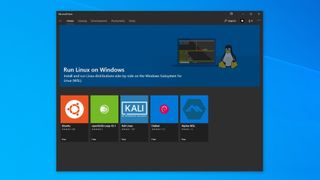Windows 10 will soon let you run Linux GUI apps with ease
The Windows 10 WSL subsystem gets its biggest update yet

Microsoft has just put out a preview of a new Windows Subsystem for Linux (WSL) feature that enables users to run graphical Linux apps seamlessly on Windows 10 desktop.
First previewed at Microsoft’s annual BUILD conference in 2020, Windows has dubbed the highly anticipated feature "WSLg", and it is available with Windows 10 Insider Preview build 21364.
Microsoft has been constantly working to improve WSL since its initial introduction in 2016. Last year, the software giant introduced an improved version called WSL 2, which has a real open source Linux kernel at its heart.
- Check our collection of the best Linux distros for business
- Here’s our list of the best Linux distros for developers
- And, these are the best laptops for developers
GUI workloads
In a blog post, Craig Loewen, a Program Manager at Microsoft working on WSL, demonstrates various use cases for WSLg, primarily for developers and testers.
Loewen mentions that when a graphical app is launched using WSLg, it will automatically start a Linux distro in the background, together with all the components required to enable the Linux GUI app to communicate with the Windows desktop.
Interestingly, WSLg also supports audio and microphone devices, which means the graphical Linux apps will also be able to record and play audio.
Furthermore, the new feature also includes the ability to make use of 3D acceleration within applications.
Are you a pro? Subscribe to our newsletter
Sign up to the TechRadar Pro newsletter to get all the top news, opinion, features and guidance your business needs to succeed!
WSLg is surely one of its biggest feature updates yet, and the subsystem’s new ability to support graphical user interfaces (GUI) will eventually make it an attractive option to a whole lot of users beyond just developers.
- Here are the best Windows 10 deals this month
With almost two decades of writing and reporting on Linux, Mayank Sharma would like everyone to think he’s TechRadar Pro’s expert on the topic. Of course, he’s just as interested in other computing topics, particularly cybersecurity, cloud, containers, and coding.
Most Popular

